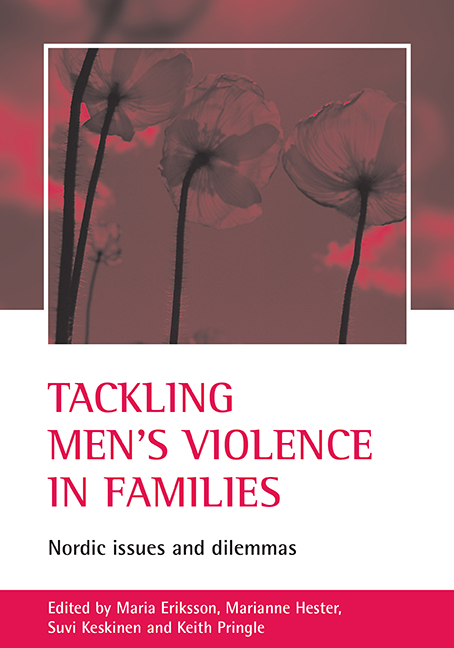Book contents
- Frontmatter
- Contents
- List of tables and figures
- Acknowledgements
- Notes on contributors
- one Introduction: Nordic issues and dilemmas
- two Children, abuse and parental contact in Denmark
- three Commitments and contradictions: linking violence, parenthood and professionalism
- four “Talking feels like you wouldn’t love Dad anymore”: children’s emotions, close relations and domestic violence
- five Bypassing the relationship between fatherhood and violence in Finnish policy and research
- six Marching on the spot? Dealing with violence against women in Norway
- seven Children’s peace? The possibility of protecting children by means of criminal law and family law
- eight A visible or invisible child? Professionals’ approaches to children whose father is violent towards their mother
- nine “Take my father away from home”: children growing up in the proximity of violence
- ten Neglected issues in Swedish child protection policy and practice: age, ethnicity and gender
- eleven Tackling men’s violence in families: lessons for the UK
- References
- Index
seven - Children’s peace? The possibility of protecting children by means of criminal law and family law
Published online by Cambridge University Press: 20 January 2022
- Frontmatter
- Contents
- List of tables and figures
- Acknowledgements
- Notes on contributors
- one Introduction: Nordic issues and dilemmas
- two Children, abuse and parental contact in Denmark
- three Commitments and contradictions: linking violence, parenthood and professionalism
- four “Talking feels like you wouldn’t love Dad anymore”: children’s emotions, close relations and domestic violence
- five Bypassing the relationship between fatherhood and violence in Finnish policy and research
- six Marching on the spot? Dealing with violence against women in Norway
- seven Children’s peace? The possibility of protecting children by means of criminal law and family law
- eight A visible or invisible child? Professionals’ approaches to children whose father is violent towards their mother
- nine “Take my father away from home”: children growing up in the proximity of violence
- ten Neglected issues in Swedish child protection policy and practice: age, ethnicity and gender
- eleven Tackling men’s violence in families: lessons for the UK
- References
- Index
Summary
Det som händer What happens är förbjudet is forbidden det är så till den milda grad so very forbidden förbjudet att det inte finns that it doesn't exist ingen tror nobody believes på det som inte finns that which doesn't exist ingen ser nobody sees ingen låtsas om nobody cares också jag vet I, too, know att det är förbjudet that it's forbidden därför händer det therefore it doesn't happen åtminstone inte mig at least not to me
This poem was written by Karolina Kraft (Kraft, 2000, p 21). The forbidden happened to her. The forbidden also happened to her as a mother and thus violence has also affected her children. Many brave testimonies have contributed to the fact that violence, which before was totally private, has been highlighted to such an extent that it has become a public, political issue in Sweden, resulting in a series of reforms aimed at curtailing violence by men towards women and children. But this violence has recently been forbidden! At the same time, a father's right to have access to his children has been strengthened. The legislator prioritises shared custody and increased rights of contact with the children. What are the consequences of this for those who seek to use the law to protect children against continued assaults by the man and father who has used violence?
This chapter will elucidate the changes in legal positions of women and children within intimate relations in criminal and family law when these relations are charged with sexualised violence. I wish to make visible the child in the gendered conflict of the adult world. Ultimately, I seek to problematise the current law in relation to human rights. This chapter begins with a few perspectives on the law before moving on to analyse the possibilities of protecting children, using examples from Swedish law.
The power of the law
Within the Nordic tradition, the written law is a weighty instrument of social control. The articles of the law can be regarded as frozen politics. The words of the law reflect officially accepted values and constructions, including those that pertain to the relations between the sexes and what relations between children and parents should be like.
- Type
- Chapter
- Information
- Tackling Men's Violence in FamiliesNordic Issues and Dilemmas, pp. 101 - 118Publisher: Bristol University PressPrint publication year: 2005



